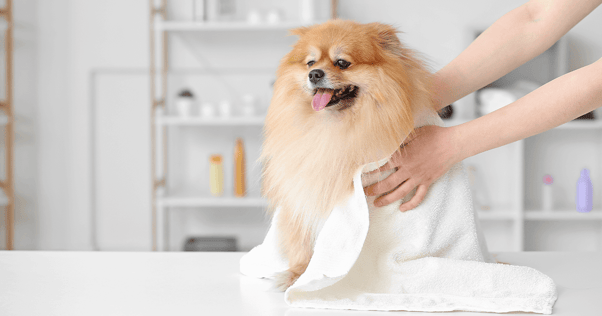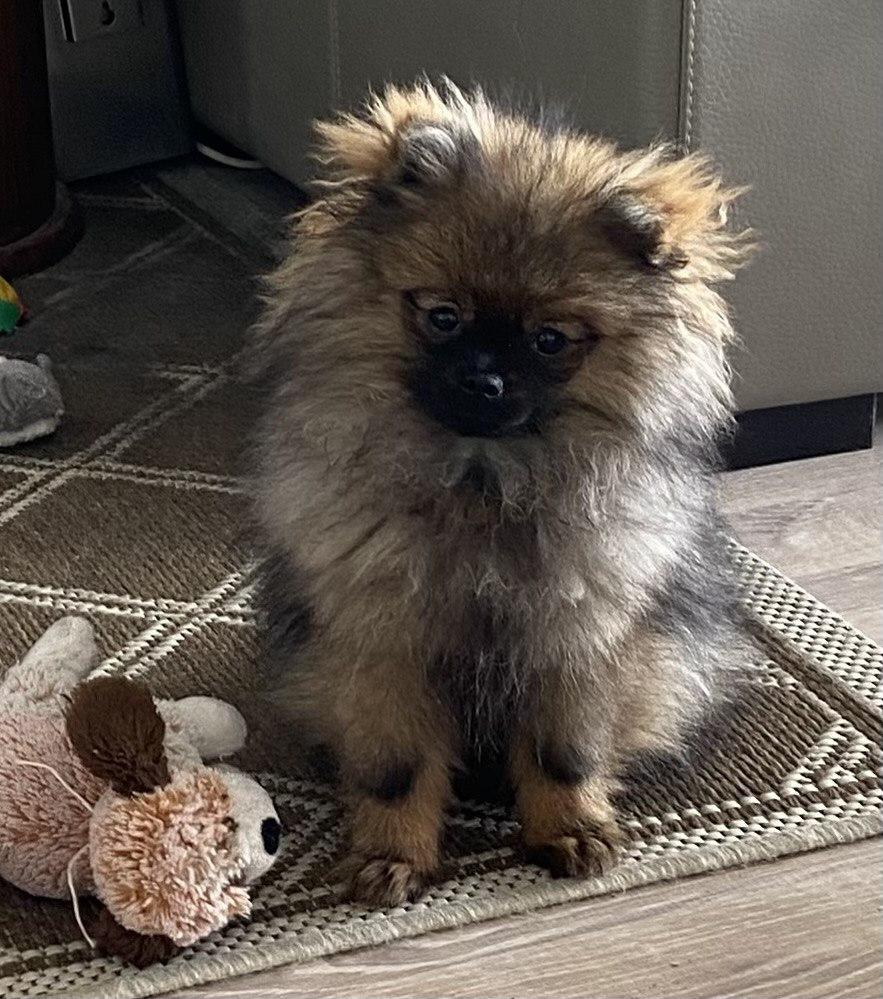When you think of an adorable, fluffy ball of energy, the chances are you’re imagining a Pomeranian. These spirited dogs are loved the world over, with fans including celebrities and historic royals through to ordinary dog lovers. But you may be wondering to yourself, is adopting a Pomeranian a good idea? We’re exploring the wonderful world of Pomeranians, discussing their suitability as companions, and sharing a few tips to ensure they’re getting the quality of care they deserve!
Poms Through History
While Pomeranians have been charming humans for centuries, they were originally much larger in size, closer to their cousins the German Spitz. In fact, the name of the breed has its roots in the region of Pomeria which is now located in Northern Poland and Germany.
As to how they became so famous, we need to look elsewhere in Europe. In the late 19th century, during one of several trips to Florence, Queen Victoria was introduced to the breed and immediately fell in love. She became so smitten in fact that she decided to bring several of the dogs back to the UK. Marco, the smallest Pomeranian of the lot, inspired her to further miniaturize the breed, turning them into the lap dogs we know today.

Mozart, Sir Isaac Newton, Martin Luther, and Michelangelo are all other notable Pomeranian fans from the past. Mozart even dedicated an aria to his Pom, Pimperl, while Michelangelo painted the Sistine Chapel with a Pom by his side!
Pomeranian Features and Grooming
At first glance, adopting a Pomeranian puppy might feel like you’re letting a toy-sized fox into your life. With their fox-like faces, triangle-shaped pricked ears, and plumed tails that arch over their backs, Pomeranians are unmistakable. Their rich double coats can come in a multitude of colours, from red, black, cream, white, and many more besides.
The downside of such an illustriously fluffy coat is that it will need daily brushing to prevent matting and your Pomeranian pup should be bathed roughly every 3 weeks. If you’re considering adopting a Pomeranian, you should also be prepared for shedding season as this can be quite heavy.

Pomeranian Temperament & Trainability
Despite their small size, Pomeranians are often described as fearless, curious, and eager to explore. Their Spitz heritage, descending from larger sled dogs, similarly ensures they have ample energy. It’s no surprise then that they enjoy physical play and thrive on mental stimulation.
For training, Pomeranians are quick learners. However, remember their independent streak; patience might be your best friend during sessions! The ADAPTIL Calm On-the-Go Collar can also be a beneficial training aid, providing your four-legged friend with comfort during moments of anxiety or uncertainty.
Pomeranians tend to be very loyal, often forming strong attachments to one human. This, combined with their small size and alertness, often makes them the perfect companion for older individuals. With their yappy barks and strong watchdog tendencies, they will certainly keep you informed of the slightest noise.

Pomeranian Health & Longevity
When adopting a dog, being aware of any health considerations is key to ensuring they live a long and happy life. Pomeranians are no exception to this rule. As a breed, they can be prone to several health issues including luxating patellas, tracheal collapse, dental problems, and Chiari malformation syringomyelia.
Before adopting a Pomeranian, you should always check with the breeder to understand any health concerns the puppy’s parents and grandparents have had. It’s also a good idea to ask about the healthcare of the pup themselves, such as whether they’ve had any worming treatment or started their vaccinations. The more information the better!
When it comes to caring for your Pomeranian, proper dental care is essential. It can be beneficial to train your Pomeranian puppy right from the start to accept toothbrushing. If this can be troubling for your dog, consider using ADAPTIL Calm to create a relaxing home environment. As with all smaller dogs, it’s also best to use a harness rather than a collar.

Are Pomeranians Right For You?
If you’re asking yourself “What dog breed should I get?”, you could certainly do a lot worse than a Pomeranian! These dogs are loyal, alert, and make excellent companions, especially for older pet parents. Their curious nature and zest for life can bring joy to any household. However, like with any pet, they require time, patience, and care.
To make your Pomeranian’s transition into your home as smooth as possible, we recommend using an ADAPTIL Calm Collar. This helps dogs to feel reassured and relaxed in everyday situations. Simply pop the collar on in advance of the pup coming home so they’re chilled for the journey ahead and their first few weeks at home.

It’s also worth bearing in mind that, while Pomeranians usually get along well with children, their small size requires gentle handling. This means they may not always be suitable for all families. Instead, it may be worth considering another breed that is better suited for young families, such as a Labrador or a Golden Retriever. On the other hand, Pomeranians do tend to coexist happily with other pets in their household.
Remember, regardless of the breed, adopting a puppy or dog is a significant commitment. Do your research and ensure you’re ready to provide a loving home for your new family member!
Are you wondering what dog breed you should get? Get in touch and we’ll be happy to share our advice. You can also stay informed with our latest tips and guides, as well as info about ADAPTIL by signing up to our newsletter. Or why not take our online quiz to find out which of our calming products is right for your pup?



